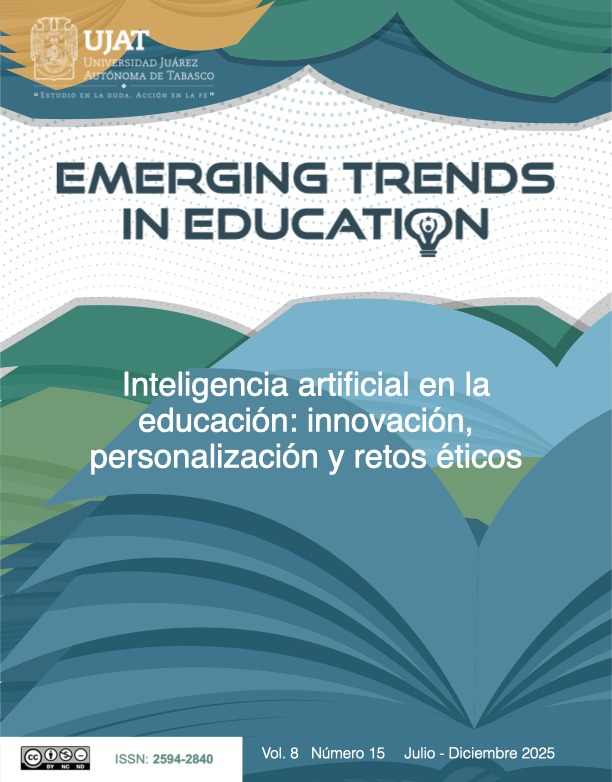Percepción de las implicaciones éticas en el uso de la Inteligencia Artificial (IA)
DOI:
https://doi.org/10.19136/etie.v8n15.6336Palabras clave:
Ética, Inteligencia Artificial, Estudiantado, Educación SuperiorResumen
El objetivo es caracterizar las consideraciones éticas en el uso de la IA en procesos educativos, analizando las percepciones de estudiantes universitarios respecto a las dimensiones física y cognitiva de la ética en la IA. Se emplea una metodología cuantitativa de enfoque mixto, con alcance descriptivo-transversal, aplicando un cuestionario adaptado del marco de Ashok et al. (2022) a 125 estudiantes de la UASLP y NEUUNI. Los resultados revelaron diferencias significativas: los estudiantes de NEUNI, con mayor edad, experiencia laboral y competencia digital, mostraron una percepción más positiva y crítica de la IA, mientras que los de la UASLP, más jóvenes y con menor exposición laboral, tuvieron percepciones más conservadoras. Factores como género, edad, ocupación y uso principal de la IA influyeron en estas percepciones. Estos hallazgos resaltan la importancia de diseñar estrategias educativas que consideren las diferencias sociodemográficas, promoviendo la formación en competencias digitales y éticas para un uso responsable de la IA. Además, se enfatiza la necesidad de colaboración entre educadores, tecnólogos y responsables de políticas públicas para garantizar una integración ética y equitativa de la IA en la educación. La investigación aporta evidencia valiosa para guiar una implementación responsable de la IA, maximizando beneficios y minimizando riesgos éticos.
Referencias
Aghaziarati, A., Nejatifar, S. & Abedi, A. (2023). Artificial Intelligence in Education: Investigating Teacher Attitudes. AI and Tech in Behavioral and Social Sciences, 1(1), 35-42. https://doi.org/10.61838/kman.aitech.1.1.6
Aisyah, Dwi Yulianti, P., Yandhini, S., Putri Sari, A. D., Herawani, I., & Oktarini, I. (2024). The Influence of AI on Students’ Mind Patterns. BICC Proceedings, 2, 183–186. https://doi.org/10.30983/bicc.v1i1.125
Akgun, S. & Greenhow, C. (2022). Artificial intelligence in education: Addressing ethical challenges in K-12 settings. AI Ethics, 2, 431–440. https://doi.org/10.1007/s43681-021-00096-7
Akintayo, O.T., Eden, C.A., Ayeni, O.O. & Onyebuchi, N.C. (2024). Integrating AI with emotional and social learning in primary education: Developing a holistic adaptive learning ecosystem. Computer Science & IT Research Journal, 5(5), 1076-1089. https://doi.org/10.51594/csitrj.v5i5.1116
AlAli, R. & Wardat, Y. (2024) Opportunities and Challenges of Integrating Generative Artificial Intelligence in Education. (2024). International Journal of Religion, 5(7), 784-793. https://doi.org/10.61707/8y29gv34
Alfaro Salas, H., & Díaz Porras, J.A. (2024). Teachers’ Perception of the Ethical Use of Artificial Intelligence in their Educational Work. Innovaciones Educativas, 26(41), 63–77. https://doi.org/10.22458/ie.v26i41.4952
Arvin, N., Hoseinabady, M., Bayat, B. & Zahmatkesh, E. (2023). Teacher Experiences with AI-based Educational Tools. AI and Tech in Behavioral and Social Sciences, 1(2), 26-32. https://doi.org/10.61838/kman.aitech.1.2.5
Ashok, M., Madan, R., Joha, A., & Sivarajah, U. (2022). Ethical framework for artificial intelligence and digital technologies. International Journal of Information Management, 62, 102433. https://doi.org/10.1016/j.ijinfomgt.2021.102433
Balta, N. (2023). Ethical Considerations in Using AI in Educational Research. Journal of Research in Didactical Sciences, 2(1), 14205. https://doi.org/10.51853/jorids/14205
Binns, R. Algorithmic Accountability and Public Reason. Philos. Technol. 31, 543–556 (2018). https://doi.org/10.1007/s13347-017-0263-5
Brynjolfsson, E. (2022). The Turing Trap: The Promise & Peril of Human-Like Artificial Intelligence. Daedalus, 151(2), 272-287. https://doi.org/10.1162/daed_a_01915
Castillo Herrera, M.E. (2023). Impacto de la inteligencia artificial en el proceso de enseñanza y aprendizaje en la educación secundaria. LATAM Revista Latinoamericana de Ciencias Sociales y Humanidades, 4(6), 515 – 530. https://doi.org/10.56712/latam.v4i6.1459
Dwivedi, Y.K., Hughes, L., Ismagilova, E., Aarts, G., Coombs, C., Crick, T., Duan, Y., Dwivedi, R., Edwards, J., Eirug, A., Galanos, V., Ilavarasan, P.V., Janssen, M., Jones, P., Kar, A.K., Kizgin, H., Kronemann, B., Lal, B., Lucini, B., Medaglia, R. & Williams, M.D. (2021). Artificial Intelligence (AI): Multidisciplinary perspectives on emerging challenges, opportunities, and agenda for research, practice and policy. International Journal of Information Management, 57, 101994. https://doi.org/10.1016/j.ijinfomgt.2019.08.002.
Estrada-Araoz , E. G., Quispe-Aquise , J. ., Malaga-Yllpa, Y., Larico-Uchamaco , G. R., Pizarro-Osorio, G. R., Mendoza-Zuñiga, M. ., Velasquez-Bernal , A. C., Roque-Guizada, C. E., & Huamaní-Pérez, M. I. (2024). Role of artificial intelligence in education: Perspectives of Peruvian basic education teachers. Data and Metadata, 3, 325. https://doi.org/10.56294/dm2024325
Floridi, L., Cowls, J., Beltrametti, M., Chatila, R., Chazerand, P., Dignum, V., Luetge, C., Madelin, R., Pagallo, U., Rossi, F., Schafer, B., Valcke, P. & Vayena, E. (2018). AI4People—An Ethical Framework for a Good AI Society: Opportunities, Risks, Principles, and Recommendations. Minds & Machines 28, 689–707 (2018). https://doi.org/10.1007/s11023-018-9482-5
Gocen, A. & Aydemir, F. (2020). Artificial Intelligence in Education and Schools. Research on Education and Media, 12(1), 13-21. https://doi.org/10.2478/rem-2020-0003
González González, S. J., & González, N. de la N. (2024). Perspectivas de docentes universitarios sobre la inteligencia artificial en la educación. Yachana Revista Científica, 13(2), 69–82. https://doi.org/10.62325/10.62325/yachana.v13.n2.2024.929
Holmes, W., Porayska-Pomsta, K., Holstein, K., Sutherland, E., Baker, T., Shum, S.B., Santos, O.C., Rodrigo, M.T., Cukurova, M., Bittencourt, I.I. & Koedinger, K.R. (2022). Ethics of AI in Education: Towards a Community-Wide Framework. Int J Artif Intell Educ, 32, 504–526 https://doi.org/10.1007/s40593-021-00239-1
Hua, J.H. (2023). Beyond exams: Investigating AI tool impact on student attitudes, ethical awareness, and academic dishonesty in online college assessments. International Journal of Educational Management and Development Studies, 4(4), 160-185. https://doi.org/10.53378/353030
Jobin, A., Ienca, M. & Vayena, E. The global landscape of AI ethics guidelines. Nat Mach Intell 1, 389–399 (2019). https://doi.org/10.1038/s42256-019-0088-2
Juca-Maldonado, F.X. (2023). Inteligencia artificial en motores de búsqueda: percepciones de los docentes universitarios y su impacto en el proceso de enseñanza y aprendizaje. INNOVA Research Journal, 8(3.1), 45–58. https://doi.org/10.33890/innova.v8.n3.1.2023.2336
Karabacak, M., Ozkara, B.B., Margetis, K., Wintermark, M. & Bisdas, S. (2023). The Advent of Generative Language Models in Medical Education. JMIR Med Educ., 6(9), e48163. https://doi.org/10.2196/48163
Khlaif, Z.N., Ayyoub, A., Hamamra, B., Bensalem, E., Mitwally, M.A.A., Ayyoub, A., Hattab, M.K., & Shadid, F. (2024). University Teachers’ Views on the Adoption and Integration of Generative AI Tools for Student Assessment in Higher Education. Education Sciences, 14(10), 1090. https://doi.org/10.3390/educsci14101090
Kotsis, K.T. (2024). Artificial Intelligence Creates Plagiarism or Academic Research? (2024). European Journal of Arts, Humanities and Social Sciences, 6, 169-179. https://doi.org/10.59324/ejahss.2024.1(6).18
Kurup, S., & Gupta, V. (2022). Factors Influencing the AI Adoption in Organizations. Metamorphosis, 21(2), 129-139. https://doi.org/10.1177/09726225221124035
Lee, J., Hong, M., & Cho , J. (2024). Development of a Content Framework of Artificial Intelligence Integrated Education Considering Ethical Factors. International Journal on Advanced Science, Engineering and Information Technology, 14(1), 205–213. https://doi.org/10.18517/ijaseit.14.1.19558
Li, F., Ruijs, N., & Lu, Y. (2023). Ethics & AI: A Systematic Review on Ethical Concerns and Related Strategies for Designing with AI in Healthcare. AI, 4(1), 28-53. https://doi.org/10.3390/ai4010003
McKinsey & Company (2021). The State of AI in 2021. https://www.mckinsey.com/~/media/McKinsey/Business%20Functions/McKinsey%20Analytics/Our%20Insights/Global%20survey%20The%20state%20of%20AI%20in%202021/Global-survey-The-state-of-AI-in-2021.pdf
Mora Naranjo , B. M., Aroca Izurieta , C. E., Tiban Leica , L. R., Sánchez Morrillo , C. F., & Jiménez Salazar , A. (2023). Ética y Responsabilidad en la Implementación de la Inteligencia Artificial en la Educación. Ciencia Latina Revista Científica Multidisciplinar, 7(6), 2054-2076. https://doi.org/10.37811/cl_rcm.v7i6.8833
OCDE (2019). Skills Matter: Additional Results from the Survey of Adult Skills, OECD Skills Studies. OECD Publishing. https://doi.org/10.1787/1f029d8f-en.
Otero Escobar, A.D., & Suárez-Jasso, E. (2025). Responsabilidad ética del uso de ChatGPT en estudiantes universitarios. Transdigital, 6(11), e406. https://doi.org/10.56162/transdigital406
Tobar Litardo, J., Rodríguez Wong, C., Martínez Ruiz, S., & Pozo Benites, K. (2023). Retos y oportunidades docente en la implementación de la inteligencia artificial en la educación superior ecuatoriana. South Florida Journal of Development, 4(2), 867–889. https://doi.org/10.46932/sfjdv4n2-020
Wang, Y., Zhang, L., & Liu, J. (2023). Gender differences in technology-enhanced learning: A meta-analysis of student preferences and outcomes. Educational Psychology Review, 35(2), 245-267. https://doi.org/10.1007/s10648-023-09745-1
Yeo, M.A. (2023). Academic integrity in the age of Artificial Intelligence (AI) authoring apps. Tesol Journal, 14(3), e716. https://doi.org/10.1002/tesj.716
Descargas
Publicado
Número
Sección
Licencia
Derechos de autor 2025 Emerging Trends in Education

Esta obra está bajo una licencia internacional Creative Commons Atribución-NoComercial-SinDerivadas 4.0.





























